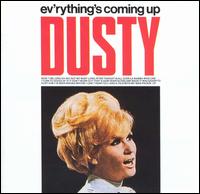| Ev'rything's Coming Up Dusty | ||||
|---|---|---|---|---|
 | ||||
| Studio album by | ||||
| Released | 8 October 1965 | |||
| Recorded | June–July 1965 | |||
| Studio | Philips (London) | |||
| Genre | Pop | |||
| Length | 35:24 | |||
| Label | Philips RBL 1002 (mono) SRBL 1002 (stereo) | |||
| Producer | Johnny Franz | |||
| Dusty Springfield chronology | ||||
| ||||
| Alternative cover | ||||
 Cover of the US version of the album, You Don't Have To Say You Love Me | ||||
| Review scores | |
|---|---|
| Source | Rating |
| Allmusic | |
Ev'rything's Coming Up Dusty is the second studio album by singer Dusty Springfield, released on Philips Records in the UK in 1965. Springfield's 1964 debut album, A Girl Called Dusty , sold well enough to make her Philips Records' top-selling female artist. For this, her second album, Philips presented it in a gatefold sleeve and included extensive liner notes. While including a number of fairly standard "pop" songs, Ev'rything's Coming Up Dusty also saw Springfield venturing more into show tunes like "Who Can I Turn To (When Nobody Needs Me)?" as well as the soul music for which Springfield became so well known for singing. "Doodlin'" and "That's How Heartaches Are Made" were minor hits for Baby Washington, one of Springfield's personal favourite singers. Springfield also included the song "La Bamba", which was a popular concert number for her, though not in step with the general style of the album. The album gave Dusty another chart success peaking at No.6 on the UK Charts and No.4 on the NME charts that following month.
Contents
In 1960s Britain, it was fairly common for hit singles to be left off albums, as it was assumed that if someone was buying the album, they already had the singles. This was not the case, however, in the US. After Springfield's song "You Don't Have to Say You Love Me" became a huge hit, Ev'rything's Coming Up Dusty was re-titled and resequenced for re-release in the United States as the album You Don't Have to Say You Love Me . This album featured most of Ev'rything's Coming Up Dusty, plus the hit title track.
Ev'rything's Coming Up Dusty was released to CD for the first time in the early 1990s, and in 1998 a re-mastered version which included extra tracks was released.